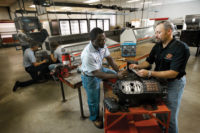
Joe
Thomas is the HVAC program coordinator and instructor at Joliet Junior College
in Joliet, Ill. He put the program back together 10 years ago, and has
established strong community ties by partnering with the local chapter of
Habitat for Humanity.
“I talk to my students all the time,” he said, adding that he gives his cell phone number to all of them. “They can call me at any time with any job-related questions they might have,” he said.
Thomas draws upon his 37 years of experience in the field to answer their questions. And if he isn’t sure how to help them, he’ll call another professor or an engineer to track down the needed information. “I get calls from students who graduated five years ago,” he said. “They just don’t disappear. There’s always that contact all the time. It’s what the students need. You just can’t talk about something and let them go.”
His philosophy is that students can avoid mistakes by learning from their instructor’s field experience. “As I tell every student, I’ve made mistakes. Learn from my mistakes.”
Thomas is proud of the fact that he works for the nation’s oldest community college. JJC was established in 1901 and boasts 14,000 full-time students. Of those, 400 belong to the HVAC program. This is a substantial growth from when Thomas joined JJC 10 years ago. Back then the existing HVAC program had been shut down. “I put it back together,” Thomas said.
To create the program he felt would be most beneficial for students, Thomas established three core concentrations of study: HVAC, electronic/electrical, and building automation. Thomas runs HVAC while Jerry Raino heads up the electronic/electrical courses, and John Koepke, PE, specializes in building automation and process controls.
Thomas is the program coordinator but, he clarified, “We’re all equals with this team. The best way you can take and teach is with this team aspect. We all work together for the betterment of the student.”
There are, of course, challenges along the way. “You have to stay up with the latest technology,” Thomas noted. “And you have to keep the students’ interest. You have to offer the best labs - that hands-on opportunity - and present course outlines so the student knows exactly what’s going to be covered and discussed.”
Thomas has spent many hours outside the classroom honing lesson content and the syllabi for each of his courses because he believes it’s imperative to include the latest trends in installation and system maintenance within each course.
He also initiated a program with the local chapter of Habitat for Humanity to provide his students with a chance to apply their newly learned skills while serving their community. Six years ago, Thomas set up a JJC contract with Habitat, and since then his students have worked to complete 20 homes.
“The students work in these beautiful, brand-new homes,” he said. “I do nothing. I walk around and say, ‘Keep your gloves and glasses on.’ They do beautiful work.” The work includes everything from layout and blue prints to ductwork and a/c installation. He added that the students love this experience.
“It was truly an eye-opening experience to get a realistic ‘new construction lesson’ designing and installing heating and air conditioning systems for Habitat for Humanity,” said student Bob Clark. “Most labs are geared for troubleshooting furnaces, while the Habitat for Humanity projects were geared for full-blown HVAC design and installations. The projects make you aware of the obstacles that are involved in real-life work environments.”
Clark, who is in his final year of the program, came to Thomas’ class with two undergraduate degrees already under his belt. But, he said, Thomas is one of the best instructors he has ever come across. “I rank Joe Thomas among my top three professors. He synthesizes an approach that incorporates workplace politics, on-the-job logic, safety perception, and realistic interpretation of unique events. Most importantly, Joe Thomas makes time for all of his students and welcomes them to this fascinating industry.”
Clark also added that Thomas has a firm belief in education and certification. “He is a firm believer in the AHRI program and after spending the last year with him, I now understand why,” Clark said. Thomas requires students to receive seven certifications - two from EPA and five from AHRI - in the first year of the program. According to Thomas, certifications “tell the employer what’s been covered.”
One of the most rewarding aspects of Thomas’ career is meeting the parents of his students and hearing how proud they are of their children’s employment in the HVAC field.
Publication date:11/08/2010







